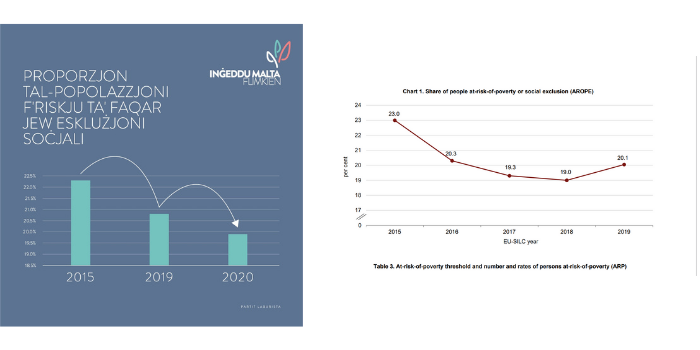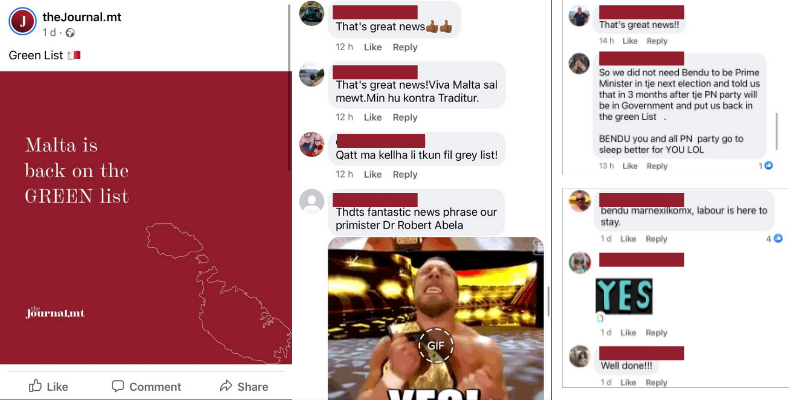On 4 October, the social media platforms Facebook, WhatsApp and Instagram were temporarily unavailable, affecting hundreds of millions of users across the globe and causing its stocks to plummet. Here at The Shift, our thoughts immediately went to all our politicians, communications officers and Party propagandists.
What would they do without Facebook and its algorithm that is purposefully designed to keep users engaged with polarising content? How would our ministers ever get by without their daily dose of “prosit ministru”?
All three platforms are up and running once again. These are some of the snippets of disinformation that have caught our attention over the last week, two of which we spotted on Facebook.
Labour’s persistent use of ‘fuzzy’ statistics
On 29 September, the Labour Party uploaded on its official Facebook page a chart claiming to show a steady decrease in the percentage of the population that is at risk of poverty. This kind of chart may be great as propaganda fodder, but it does raise a number of questions.
To begin with, there is no way of gauging what parameters were used to create this chart. There is no data source attached to the chart or in the Facebook post.
Publicly available information on the percentage of the population that is at risk of poverty was published by the National Statistics Office in December last year and it tells a different story. In its publication, the NSO charts how in 2019, the at-risk-of-poverty or social exclusion rate was estimated at 20.1% of the population living in private households in Malta. The 2019 rate increased by 1.1 percentage points when compared to 2018.

Labour Party’s chart compared to that of the National Statistics Office
This is not the first time the Labour Party played around with numbers to suit whatever narrative they wanted to feed their supporter base.
In August last year, the Labour Party released a video titled ‘The truth about the Covid-19 situation in Malta’ where data was cherry-picked to give the impression that the situation in Malta was under control. The same can be said of the random percentages thrown about by Minister Carmelo Abela about the “completion” of the Labour Party’s electoral manifesto that cannot be realistically corroborated in any shape or form.
As far back as 2018, the government was making use of slick but misleading infographics to bolster its claims to success, and ever since The Shift has been monitoring these tactics it is safe to say that nothing has changed.
Without providing data, references or context, there is still no way of evaluating the government’s claims and as the latest example underscores, these charts and numbers may as well have been pulled out of thin air. Otherwise stated, “it is so because I say so”.
Playing around with words
If it’s not charts, then it’s words. The Labour-owned English language news portal led its readers to think that Malta was no longer greylisted by the FATF, by simply excluding some essential words in one of their headlines.
On 30 September, the portal uploaded an image with the words “Malta is back on the GREEN list” with a sub-heading simply saying, “Green List”. The image was referring to Malta being placed on the EU’s travel green list after spending the summer months on the red and orange lists.
Unsurprisingly, Facebook users had an entirely different list in mind and that is the FATF grey list of which Malta is still very much part. The comments that followed were a mixture of celebration (thinking Malta was off the FATF grey list) and confusion, with people wondering why this was not a major news item in other newspapers.

The original post by Labour owned The Journal and some of the accompanying Facebook comments.
One troubling aspect of this kind of wordplay is that those behind headlines like this are, or ought to be, well aware that excluding crucial words in a headline is a way of manipulating your unquestioning readers – readers who have been moulded to take the party’s word as gospel with daily little doses of disinformation strategies such as charts without data or manipulated video footage.
Another aspect is that there appears to be a sudden surge in online news portals similar to The Journal. These “pop-up” sites are more opaque about their ownership and authorship but still infiltrate Facebook newsfeeds with more misleading content.
Why does no one look at international studies?
The minister responsible for public broadcasting, and one of the prime minister’s many hot potatoes, Carmelo Abela, was reported on Monday criticising Opposition leader Bernard Grech’s claims that the public broadcaster is under the control of the Labour Party and government.
Abela’s reply to Grech’s criticisms is the standard one that we’ve come to expect. “It’s all the nationalists’ fault…”, “the Opposition is not credible…”, and so on and so forth.
What is astonishing is that no one from either political party appears to be considering the studies by international organisations that have clearly relegated PBS to the category of State-controlled media.
Two studies were published this year that featured Malta’s public broadcaster, both of which got very little attention locally. In July this year, the country report by the Centre for Media Pluralism and Media Freedom prepared by the European University Institute found that the highest risk scores for Malta remain those of political independence (94% risk level) in connection with political party-owned media, and the lack of independence in public service media governance, funding and editorial freedom.
More recently, a comparative study launched by the Center for Media, Data and Society found that nearly 80% of the world’s State media lack editorial independence. This included our very own PBS.
To further corroborate the studies that everyone seems hell-bent on ignoring, a memo sent to PBS current affairs programme presenters has been doing the rounds on social media. It states all producers working on current affairs shows airing on the national broadcaster’s channels are to “obtain approval from the PBS management” 15 days before the programme is aired.
This has led to widespread criticism of CEO Mark Sammut and Head of News Norma Saliba, both political appointees. Importantly, concerns were expressed about the censoring of information and the whitewashing of reputations in the lead up to an election in which the Party in government is hounded by corruption allegations.













The government resorts to disinformation because the truth is to its disadvantage.
We should be thankful for the Shift team and we should support them for the response to disinformation.